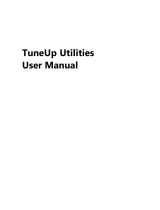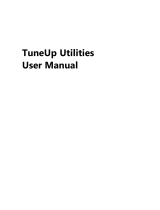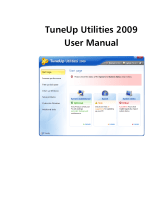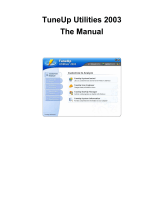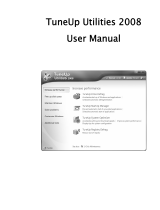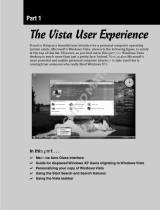Page is loading ...

TuneUp Utilities
User Manual

Microsoft, Windows, Windows XP, Windows Vista, Windows 7, Office, Outlook, Windows Logo, MSN, Windows Messenger and Internet Explorer are products,
registered trademarks or protected names of Microsoft Corporation in the USA and/or in other countries. Firefox is a product and registered trademark of
the Mozilla Foundation in the USA and/or other countries. Safari is a product and registered trademark of Apple Inc. in the USA and/or other countries.
Opera is a product and a trademark of Opera Software ASA. Other products and brand names can be products and/or brands of their respective owners.

Table of Contents
1. Welcome to TuneUp Utilities 5
New Features in this Version 6
System Requirements 7
Help & Support 7
2. The Start Center 8
The Tuning Status 10
3. Status & Recommendations 12
1-Click Maintenance and Automatic Maintenance 14
Increasing Performance 18
Fixing Problems - Details 22
Configuring Live Optimization 23
4. Optimizing the System 26
Disabling Programs 27
Displaying and Uninstalling Programs 31
Disabling Startup Programs 34
Configuring Turbo Mode 38
Cleaning the Registry 43
Defragmenting the Registry 50
Removing Broken Shortcuts 53
Accelerating System Startup and Shutdown 55
Defragmenting the Hard Disk 58
5. Gaining Disk Space 62
Cleaning the Hard Disk 63
Finding and Deleting Large Amounts of Data 67
Securely Deleting Data 74
6. Fixing Problems 77
Fixing common problems 77
Checking the Hard Disk for Errors 79
Managing Running Processes 82
Restoring Deleted Files 85
Showing System Information 88
TuneUp Utilities Manual 3

7. Customizing Windows 90
Changing Windows Appearance 91
Modifying Windows Settings 109
8. Overview of All Functions 132
Editing the Registry 136
Undoing Changes 138
Checking for Updates 141
Displaying the TuneUp Optimization Report 143
9. Rating Function for Programs 144
10. The TuneUp Utilities Gadget 146
11. TuneUp Utilities in taskbar notification area 148
12. Index 149
TuneUp Utilities Manual 4

1. Welcome to TuneUp Utilities
Congratulations on choosing TuneUp Utilities! You have just acquired a comprehensive collection of over
30 different tools to optimize your PC. Use this software to revitalize PCs, notebooks or netbooks with a mini-
mum of effort!
With TuneUp Utilities can also automatically run important maintenance tasks, such as cleaning up your
hard disk and registry, for you, or you can run them yourself manually. A slow and untidy computer is now a
thing of the past for you. TuneUp Utilities recognizes whether there are any problems on your system and
offers simple solutions. You can also use TuneUp Utilities to customize the appearance of your Windows
system to your personal requirements.
This version's new feature is the TuneUp Program Deactivator™. You can use the brand new TuneUp Pro-
grams-on-Demand Technology™ to fully disable programs and thereby reduce system load, without hav-
ing to uninstall them completely.
We hope you enjoy using TuneUp Utilities and your new, revitalized PC!
The TuneUp Team
TuneUp Utilities Manual 5

New Features in this Version
With TuneUp Utilities you can make sure your PC, notebook or netbook is in the best of health – all without
any expensive upgrades! Below is an overview of the most important new features in this version:
TuneUp Program Deactivator with TuneUp Programs-on-Demand Technology™
Now, for the first time, you can completely disable programs and reduce their load on your PC: the services,
startup programs, background processes or planned tasks of a disabled program are inactive until you need
them again. This prevents a loss of performance following numerous program installations.
Improved TuneUp Turbo Mode
The TuneUp Turbo Mode now gives you an even greater performance boost whenever you need it. It now
shuts off nearly 80 hindering factors in the background to provide greater performance for your work, more
fluid gameplay and full control over the hindering background activities.
The New TuneUp Tuning Status
Thanks to the clear graphs, the TuneUp Tuning Status shows you at a glance how well you are using
TuneUp Utilities to optimize your PC. You are shown any remaining potential here by the relevant noti-
fications.
The New Rating Function for Programs
TuneUp Utilities now gives you the option of rating the usefulness of programs and seeing the ratings of
other TuneUp Utilities users. This may help you to decide which programs you really need. So that you can
apply this new-found knowledge immediately, the Rating function for programs is directly integrated in
the TuneUp Program Deactivator, TuneUp StartUp Manager and TuneUp Uninstall Manager modules.
The New-Look Start Center
TuneUp Utilities gives you full control of and access to the most important tuning steps, as well as a clear
overview. The new Start Center is now even more intuitive to operate. Thanks to the arrangement into cat-
egories, you will find the function you are looking for more easily and can check on the current status of
your PC at any time.
The New Overview of all Functions
TuneUp Utilities now has an Overview of all functions on the Start Center which gives you an overview
sorted by application area and quick access to all functions and settings.
TuneUp Utilities Manual 6

System Requirements
l Windows XP (Service Pack 2 or higher), Windows Vista or Windows 7 (all 32-bit or 64-bit versions)
l Min. 300 MHz processor
l 256 MB RAM
l Screen resolution at least 1024x600 pixels
l Online version: at least 80 MB of free disk space
l CD version: at least 300 MB of free disk space (and CD-ROM or DVD drive)
l Internet Explorer 6 or higher
If you have bought the CD version of TuneUp Utilities, but your netbook doesn't have a CD-ROM drive, you
can download our trial version from www.tuneup-software.co.uk and activate it using the product key
given on the CD case.
Help & Support
TuneUp Utilities has been designed to be as user-friendly and intuitive as possible. This manual provides
you with an overview of TuneUp Utilities. Taking the layout of the Start Center as a guide, it explains what
the many different functions do and how to access and use them.
Online at www.tuneup-software.co.uk, you will find more information, tips & tricks, the Program Help in
PDF format with lots of additional pictures, frequently asked questions about TuneUp Utilities and TuneUp
Support.
You can reach TuneUp Support by calling +49 6151 4938610 (Mon - Fri, 8 am - 6 pm, GMT) or via the
TuneUp Support Website www.tuneup-software.co.uk/support. It will help support staff greatly if you
know your TuneUp Utilities version number. You can find this by going to the Help & Support menu in the
Start Center and selecting About.
TuneUp Utilities Manual 7

2. The Start Center
The TuneUp Utilities Start Center has been completely redesigned and is now even more user-friendly, pro-
viding central access to all functions.
The five categories
The main area in the TuneUp Utilities Start Center comprises five categories, giving you fast access to the
key features of TuneUp Utilities sorted by topic.
Status & Recommendations
The Status & recommendations category shows you an overview of the current condition of your system
and gives you recommendations on how you can improve the system's health. To the far right of the cat-
egories, you can see the status of your TuneUp Live Optimization and can adjust it to suit your needs
simply by clicking Configure Live Optimization.
(For more information, see Status & Recommendations, p. 12.)
Optimizing the System
Under Optimize system, you can disable or uninstall unwanted programs and clean up your system and
your data.
(For more information, see Optimizing the System, p. 26.)
Gain disk space
Under Gain disk space, you can delete unnecessary data systematically from your system.
(For more information, see Gaining Disk Space, p. 62.)
Fixing Problems
Under Fix problems, you will find simple solutions to any problems that might occur.
(For more information, see Fixing Problems, p. 77.)
Customizing Windows
Under Customize Windows, you have many opportunities to customize your working environment to suit
you.
(For more information, see Customizing Windows, p. 90.)
TuneUp Utilities Manual 8

Overview of All Functions
To the right of the categories, you will see the Overview of all functions. This lists all the functions that are
available in TuneUp Utilities - clearly sorted by application area.
Turbo Mode
The improved version of TuneUp Turbo Mode, which is now even more powerful, provides an immediate
performance boost whenever you need it. When you put your computer into Turbo Mode, an analysis is per-
formed to see which of those programs and functions currently running in the background are not strictly
necessary. These programs are stopped or slowed down, allowing the additional processing power gained
to be used exclusively by the programs you are actually running.
Tuning Status
The TuneUp Tuning Status is your personal indicator of optimization progress, i.e. it shows you how well
you are already using TuneUp Utilities and where there is still potential to optimize your system further. The
Tuning Status shows you details of both the Completed optimizations and the potential you have
exploited. The Tuning Status also helps you to recognize the remaining Unused potential and make use of
it.
The Menu Bar
The menu bar gives you access to TuneUp Utilities configuration dialogs and information on the program.
The "Settings" Menu
Use the Settings menu to go to the most important TuneUp Utilities configuration dialogs. Here you can
customize the program to suit your needs, apply maintenance settings, and configure TuneUp Live Opti-
mization, TuneUp Turbo Mode and the update check.
The "Help & Support" Menu
The Help & Support menu provides you with access to the extensive program help with detailed instruc-
tions and program information. You can also click the link there and go to the TuneUp website directly
(www.tune-up.com). Clicking on Check for updates starts the TuneUp Update Wizard module, which
checks whether there are any new updates for your TuneUp Utilities.
If you are using a trial version of TuneUp Utilities and already have a product key, click here on Activate
product and enter your product key. If you do not yet have a product key, you can click Buy product to go
directly to the TuneUp Shop website and buy a full version.
If you want to register your product, click Register product after you have successfully activated it. Enter
your name and your e-mail address.
The Footer
Clicking on the Undo changes button in the footer takes you to the TuneUp Rescue Center module, which
you can use to monitor and undo changes that you have made to your system with TuneUp Utilities. You
can also manage restore points and thereby undo system changes that you did not make using TuneUp Util-
ities.
TuneUp Utilities Manual 9

The Tuning Status
The Tuning Status uses a graph and associated notifications to show you how extensively you are already
using the options of TuneUp Utilities to increase performance and maintain the system and what potential
for optimization still remains.
You can find the TuneUp Tuning Status on the TuneUp Utilities Start Center beside Turbo Mode. The Tun-
ing Status is your personal indicator of optimization progress, i.e. it shows you how well you are already
using TuneUp Utilities and where there is still potential to optimize your system further.
The Graph
In the graph, the blue sections on the left represent the modules you have used to make your optimization
progress so far, and the dark gray area on the right represents open optimization options. Each section of
the graph has a message assigned to it: the letters in white boxes above the graph represent messages about
optimizations completed, the dark gray under the graph represents messages about untapped potential.
The Turbo Mode segment to the right of the graph shows you how many Turbo Mode options you have
turned on. If you have not yet configured Turbo Mode, this segment is empty. If the segment lights up
green, Turbo Mode is on.
Messages
To the right of the graph, you will see the current messages about optimizations already completed and
about untapped potential. If you click on the blue underlined text in the messages under Unused potential,
this opens the precise TuneUp Utilities module that you can use to achieve the unused potential.
Use the arrow to click through the individual messages. If you click on the blue underlined text between the
arrows, a window opens with an overview of all Tuning Status messages. This displays a complete overview
with all of the current messages on both the Completed optimizations and Unused potential areas
together with the corresponding graph sections and letters.
Even if your system is perfectly optimized today, anything could change tomorrow that could
present areas for optimization, e.g. the installation of new programs or a change to system settings.
Pay attention to the messages on unused potential in order to keep your system optimized for the
long term and therefore maintain a good Tuning Status.
TuneUp Utilities Manual 10

What is Used to Calculate the Tuning Status?
TuneUp Utilities performs an analysis to see which optimizations it can perform on your system. This poten-
tial is displayed in a graph showing you how close your system is to having 100% optimization. You will
achieve 100% – the perfect Tuning Status and therefore a fully filled out graph – when you implement the
recommended optimization potential for your system as much as possible.
The graph is made of different sections. The sections on the left-hand side represent optimizations com-
pleted and the sections on the right-hand side show optimization potential still remaining. The Tuning
Status is calculated based on the analysis results of the following sections:
Automatic Maintenance, 1-Click Maintenance and Manual Maintenance
For this section to be considered as optimized, one of the following conditions must be fulfilled:
l Automatic Maintenance must be activated with all the necessary maintenance tasks enabled or
l TuneUp 1-Click Maintenance is carried out within 14 days of use with all the necessary maintenance
tasks or
l TuneUp Registry Cleaner and TuneUp Shortcut Cleaner are run within 14 days and Temporary files
are deleted within 14 days of use.
To delete Temporary files, open the Gain disk space category in the Start Center. Click on Unnecessary files
under Clean hard disk and check the Temporary files box.
Live Optimization
For this section to be considered as optimized, the two Live Optimization options should be enabled. These
two options have the same weighting.
Increasing Performance - Details
Please note that you must answer the questions on your profile in order to receive appropriate rec-
ommendations for your system.
For this section to be considered as optimized, the following condition must be fulfilled:
l You have either accepted or hidden all recommendations.
Recommendations that you have hidden for 30 days will cause the status to be reclassified when this period
expires and the recommendation will be displayed again.
Fixing Problems - Details
For this section to be considered as optimized, the following condition must be fulfilled:
l You have either fixed or hidden all problems.
Problems that you have hidden for 30 days will cause the status to be reclassified when this period expires
and the problem will be displayed again.
Program Deactivator and StartUp Manager
The Tuning Status analyzes how many of your existing programs are using up your system's resources and
recommends that you optimize these through TuneUp Program Deactivator or TuneUp StartUp Manager.
In doing so, the Tuning Status takes into account the fact that you have classified some of your programs
as important despite their system load and that they should remain active. Therefore this section of the
graph is considered as optimized after a certain number of programs have been disabled.
Temporary Performance Boost from Turbo Mode
The Turbo Mode is not considered when the current Tuning Status is calculated. The Turbo Mode segment
to the right of the graph shows you the current status of Turbo Mode. When Turbo Mode is on, the seg-
ment is green.
TuneUp Utilities Manual 11

3. Status & Recommendations
The Status & recommendations category shows the current status for the three key functional areas that
TuneUp Utilities has to offer. In the event of warnings or recommendations, you can use the Show details
link to immediately address the problem behind the warning or view the recommendations.
"Maintain System" Area
The status in the Maintain System area shows how often your computer is maintained.
This takes into account whether Automatic Maintenance is carried out regularly with
the most important maintenance tasks or whether you have manually run 1-Click Main-
tenance recently.
Beneath the status display, you will see two options: Change maintenance settings
and 1-Click Maintenance.
If you click on Change maintenance settings, a window opens in which you can spec-
ify maintenance tasks that must be carried out by Automatic Maintenance and 1-Click Maintenance. For
Automatic maintenance you can specify when it should be carried out.
If you click on Start 1-Click Maintenance, 1-Click Maintenance will be carried out with the default TuneUp
Utilities settings or the changes to the maintenance settings made by you.
"Increase Performance" Area
The status field in the Increase performance area shows whether TuneUp Utilities has
determined opportunities for increasing your computer's performance. For example,
you may receive recommendations for increasing the speed of your Internet con-
nection, uninstalling programs that haven't been used for a while or upgrading your
hardware.
However, in order to get the most out of performance recommendations that are per-
sonalized to your requirements, you must first answer some questions regarding your
usage profile. Click Create profile.
If there are recommendations, you can view these by clicking Show details or the link to the rec-
ommendations. Each recommendation has a detailed description and you can apply most recommendations
with just a click of the mouse. You can also hide individual recommendations. Once all recommendations
have been applied or hidden, the status for this area reverts to green.
TuneUp Utilities Manual 12

"Fix Problems" Area
The status in the Fix problems area shows whether everything is working fine on your
computer or whether critical problems have been detected which may affect the sys-
tem's health. For example, a check can be carried out to see if key Windows settings
have been configured correctly, if there is enough free space on your system drive or
whether important security programs have been installed.
If problems have been found, click Show details. For each problem, you will receive a
description and can choose if you want to solve it now or hide it until later. Once all
problems have been solved or hidden, the status of this area reverts to green.
Configuring Live Optimization
On the far right in the category, you will see the status of your TuneUp Live Optimization. Simply click Con-
figure Live Optimization to customize the feature to suit you.
TuneUp Utilities Manual 13

1-Click Maintenance and Automatic Maintenance
All modifications to your system will be monitored by TuneUp Rescue Center and can be undone if
necessary.
Maintenance Tasks
1-Click Maintenance and Automatic Maintenance make sure that your computer is always kept clean, so
that the system runs quickly and reliably.
As its name suggests, Automatic Maintenance regularly and automatically performs the most important
maintenance work on your system to ensure that Windows remains fast and stable. 1-Click Maintenance
does the same - except that just one click is necessary: The link for starting 1-Click Maintenance can be
found in the status field of the Maintain system category in the Start Center.
The Automatic Maintenance is particularly useful for all users who would rather sit back or do other things
than worry about the maintenance of their computer.
1-Click Maintenance is particularly suited to those users who would rather set the time for maintenance
themselves and wish to monitor its progress. After maintenance has been performed by 1-Click Main-
tenance, further details on any problems found are also displayed.
By default, 1-Click Maintenance performs the following tasks for you:
TuneUp Utilities Manual 14

1-Click Maintenance ...
... cleans your registry
Over time, the central Windows registry becomes filled with hundreds of superfluous entries. These include
references to non-existent files, backlogs of programs deleted long ago and faulty entries. Your registry is
cleaned, making your Windows system fast and problem-free. For more information, see Cleaning the Reg-
istry, p. 43.
... defragments your registry
Even after the registry has been cleaned as described above, it is not automatically smaller because the disk
space that is freed up is not released. This feature compresses the registry by deleting these gaps. For more
information, see Defragmenting the Registry, p. 50.
... removes broken shortcuts
1-Click Maintenance checks whether there are any broken shortcuts on your desktop or in the Start menu
or Quick Launch taskbar and then automatically deletes them. At the same time, a search is also made for
faulty entries in the history lists of various programs such as Windows Media Player or Microsoft Office. For
more information, see Removing Broken Shortcuts, p. 53.
... gains disk space by deleting unnecessary files
So-called "temporary" files are something of a nuisance. Windows and programs create temporary files on
the hard disk, in order to temporarily store certain settings or data. If the program in question is closed,
these files should really be deleted from the program. However, the program in question often "forgets" to
clean up after itself so that over time your hard disk can be filled with a lot of unnecessary data. 1-Click
Maintenance reliably deletes all temporary files and folders from your hard disk. For more information, see
Cleaning the Hard Disk, p. 63.
... optimizes system startup and shutdown
Some programs that are run each time you start your system slow down the startup process to an unnec-
essary extent. Such known programs that are definitely not required are turned off here. For more infor-
mation, see Accelerating System Startup and Shutdown, p. 55.
... defragments your hard disk
In the background, TuneUp Utilities changes the arrangement of files and folders so that they can be read
more quickly. Regular defragmentation is paramount - especially if the data structure of your hard disk
changes frequently, for example because you move or delete files or install new programs. Defragmentation
is, however, only carried out when necessary. And you can even choose whether - if it was determined that
defragmentation was necessary - a thorough or a quick defragmentation should take place, or whether this
should depend on the result of the analysis. For more information, see Defragmenting the Hard Disk, p. 58.
The Automatic Maintenance function is also configured so that it performs all these maintenance tasks.
However, it is run in the background and only the notifications tell you when it was carried out.
TuneUp Utilities Manual 15

How to Make Maintenance Settings
In the Start Center, click on the Change maintenance settings link in the Maintain system area of the Status
& recommendations category. A configuration dialog opens containing one tab for Automatic Main-
tenance and one for 1-Click Maintenance respectively. Configure your settings here.
Alternatively, you can open the maintenance settings window by going to Overview of all functions in the
Start Center and selecting the Configure maintenance entry under TuneUp settings.
Performing Maintenance
You can specify whether and when Automatic Maintenance should run automatically in the background.
You can even have automatic maintenance run only in idle mode, i.e. it only starts when you are not cur-
rently working on your computer and no programs are required in the background. This way Automatic
Maintenance will never interrupt your work. If you select this option, following the number of days spec-
ified by you, maintenance will be attempted as soon as your computer is in idle mode. Three days is selected
by default.
If, after a period of a week, it was not possible to perform full maintenance because your computer was not
in idle mode for long enough then - if you enable this option - maintenance will be carried out anyway. This
prevents your computer from not being maintained over a long period of time.
If you choose scheduled maintenance, the procedure is similar: If your computer is not switched on at the
time of scheduled maintenance, Automatic Maintenance is performed 5 minutes after you next start your
PC. This option can also be disabled.
TuneUp Utilities Manual 16

Maintenance Tasks
Because TuneUp Utilities preferably wants to provide comprehensive maintenance for your computer, all
maintenance tasks are activated by default for both Automatic Maintenance and 1-Click Maintenance.
However, if you do not want certain maintenance tasks to be performed, you can exclude them from main-
tenance. For example, if you would rather defragment your hard disk manually, simply clear the Defrag-
ment hard disks checkbox.
Tools
If the notification that appears after maintenance disturbs you, you can switch it off here. Simply uncheck
the Show maintenance report as notification checkbox.
If you work with a portable computer, you can also specify - in addition to the other options - that you
don't want maintenance to be performed when the computer is running off the battery, so as not to reduce
the battery life unnecessarily. This option is enabled by default.
TuneUp Utilities Manual 17

Increasing Performance
In the following chapters, you will find out why it is important to do so and how you can use Increase per-
formance to increase the performance of your system, by turning off unnecessary tasks and services.
All modifications to your system will be monitored by TuneUp Rescue Center and can be undone if
necessary.
Increasing Performance - Introduction
You can improve your system performance by turning off tasks and services that run in the background
and that you rarely, if ever, need for your day-to-day work. For tablet PC compatibility (i.e. the option of
operating the computer by moving a stylus across the screen) or network server technologies. You can also
increase the performance of your computer by uninstalling programs. A search is therefore run for programs
that have not been used for a long time - programs that you may not even remember you had and which
slow down your system unnecessarily. TuneUp Utilities also recognizes when your computer hardware is
not powerful enough.
Your Internet settings can prevent Windows from using the bandwidth of your Internet connection opti-
mally. Downloading two files at once or downloading data from websites can be slowed down by Windows
default settings. You will also be shown the potential for optimization here too.
Should your computer be slowed down by superfluous visual effects, this will be identified.
TuneUp Utilities checks your computer for such performance-sapping visual effects and provides rec-
ommendations for increasing performance.
To enable TuneUp Utilities to provide you with comprehensive recommendations, you must complete the
profile before running the software for the first time. The way is then clear to a rapid and simple per-
formance boost.
All modifications to your system will be monitored by TuneUp Rescue Center and can be undone if
necessary.
TuneUp Utilities Manual 18

How to Increase the Performance of Your Computer
You can find out if you have any recommendations by going to the Status & recommendations category
in the Start Center and looking at the status fields of the Increase performance area. If you have hidden
some recommendations, these do not impact the status any more. Open the details window by clicking on
the Show details link.
When you open this window for the first time, you must answer the short questions from the profile wizard,
so that the optimization can be precisely tailored to your situation and needs (see Increase performance -
Profile, p. 19).
Overview
The details window opens on the Overview tab, where you can find out whether there is any potential for
increasing performance. In the areas Internet settings and Visual effects, you can perform all the opti-
mization recommendations found by clicking Optimize all. This will not restrict any of your important func-
tions.
The recommendations in the Hardware and software area on the other hand depend heavily on your usage
behavior. This is why you can only apply them one at a time.
Switching tabs
Click on a recommendation or on the Details button to move to the other tabs, where you can view the
details of each recommendation. Alternatively, you can click on the name of the tab you want.
Applying Recommendations
In the Internet settings and Visual effects tabs you can perform all the optimization recommendations
found by clicking Optimize all. Alternatively, you can click on a recommendation in the left column. In the
right-hand area of the window, a detailed description will appear and you can apply the recommendation
by clicking on the button on the bottom right.
In the Hardware and software tab you must answer a few simple questions on each recommendation in
order to receive suitable options to continue. If you can't answer a question or want to postpone the deci-
sion, you can hide the recommendation by clicking on Hide recommendation on the bottom right.
Please note that you cannot of course simply accept the recommendations concerning your hardware, but
can only hide them.
Hiding and Showing Recommendations
If you do not want to accept a recommendation, click Hide recommendation. Now you can select whether
you want to hide it permanently or only for 30 days. The number of hidden recommendations is always dis-
played in the taskbar on the right. By clicking on the number displayed, you can easily show these rec-
ommendations again.
Changing a profile
Selecting Change profile on the top right takes you to the profile, which shows the basis for your opti-
mization recommendations (see Increase performance - Profile, p. 19).
Increase performance - Profile
The first time you use TuneUp Utilities, you are prompted to complete a profile, so that it can provide you
with tailored recommendations for increasing performance. This profile contains the following questions:
TuneUp Utilities Manual 19

How is your computer usually connected to the Internet?
Select the type of connection from the list so that your network, Internet and browser settings (for example
packet sizes) can be adapted as best as possible to your Internet connection.
What criteria should be used to optimize visual effects?
If you select Maximum performance (irrespective of display quality), all effects and the colorful Luna
theme are turned off. This is highly recommended, especially for slower computers, because the display of
these sophisticated interfaces really eats up resources.
If you select Maximum performance (irrespective of display quality), all effects including the Aero glass
theme are turned off. This is highly recommended, especially for slower computers, because the display of
these sophisticated interfaces really eats up resources.
If the interface on your computer flickers and it takes a while for windows to open, choose the option A bal-
ance between performance and display quality. The attractive interfaces are retained but the performance-
sapping effects are switched off.
If you have a high-performance graphics card, your system performance will not be improved by
turning off the Windows Vista Aero desktop experience.
How Many Days Should a Program Remain Unused Before We Recommend
Removing it?
Your computer is checked for programs that have not been used for a long time. These are then displayed
with the recommendation that they are removed so that they do not slow down your computer unnec-
essarily. Based on your user behavior, you specify here after how many days a program that has not been
used is considered to be potentially unnecessary and displayed with the recommendation that it is removed.
TuneUp Utilities Manual 20
/
